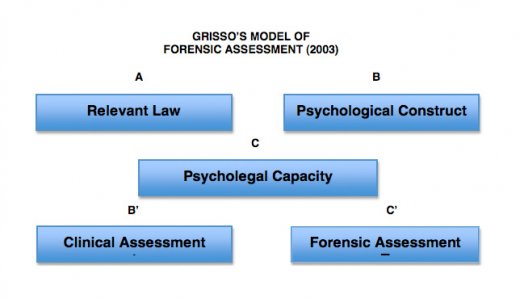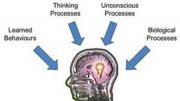
Forensic psychology is a branch of psychology which relates to the law. The main part of forensic psychology is working with the criminal justice system.
Forensic psychology is the use of psychological practices and principles and applying them to the legal system, mainly in court. In 1893 James McKeen Cattell at Columbia University was the first to research and study the psychology of testimony.
The American Psychological Association Council of Representatives in 2001 recognized Forensic psychology as a specialty. A broad definition for forensic psychology includes two parts. The first part is to research human behavior that is and/or can be related to the legal process. The second is the use of psychological practice to consult on and within the legal system, including both criminal and civil law.
The public part of a forensic psychologist’s time is spent in a courtroom working as a witness for the court. He or she answers questions based on interviews and discussions with people suspected of a crime. One aspect of the forensic psychologist is to give evidence as to the suspect’s ability to stand trial. Another is his or her thoughts about the accused's state of mind at the time of the offense. At sentencing, a forensic psychologist may give evidence of mitigating circumstances arising from the acuused's condition at the time.
Forensic psychology has some major roles in a court that bring psychology into a legal arena. The first is "malingering" a defendant is pretending to have a mental illness, or is lying to the court about his state of mind. A forensic psychologist keeps in mind that a defendant may have a mental disorder but also keeps in mind to watch for signs of deception, or errors in the defendant’s story. Another job of a forensic psychologist is to investigate the state of mind of the defendant at the time he or she committed the crime. Another is to see whether or not the defendant is able to be charged with the crimes due to his or her mental condition. Another job is to evaluate the defendant to see if he or she are able to be rehabilitated, or if they might commit the crime again.
The branch of psychology known as Forensic psychology has been in existence for a little over 50 years. This branch of psychology has gone through many changes throughout the years.
Source: simple.wikipedia.org
|
Perfect Phrases for Writing Job Descriptions: Hundreds of Ready-to-Use Phrases for Writing Effective, Informative, and Useful Job Descriptions (Perfect Phrases Series) eBooks (McGraw-Hill Education) |
You might also like:

















the science dealing with the mind and mental processes, especially in relation to human and animal behavior. adj., adj psycholog´ic, psycholog´ical.
The narrow definition of forensic psychology relates to the provision of psychological information for the purpose of facilitating a legal decision. The broad definition allows any activity that links psychology to the law to be described as Forensic.
I talk about this in greater detail on the what is forensic psychology page of my forensic psychology website.
Hope this helps
David